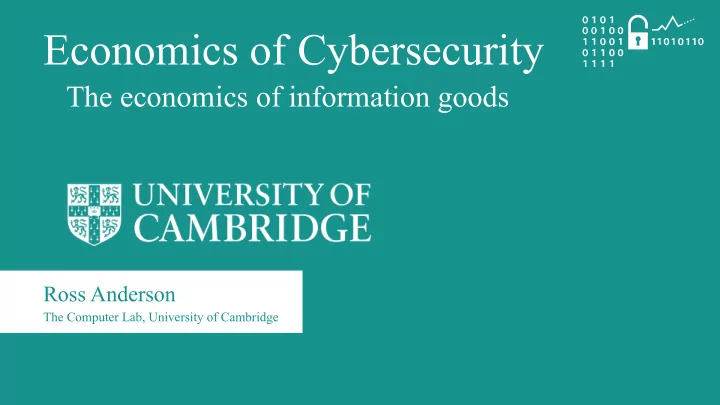

Economics of Cybersecurity The economics of information goods Ross Anderson The Computer Lab, University of Cambridge
Informa4on ¡wants ¡to ¡be ¡free! ¡ The ¡marginal ¡cost ¡of ¡producing ¡ § informa4on ¡is ¡zero, ¡so ¡that ’ s ¡the ¡ default ¡market ¡clearing ¡price! ¡ E.g. ¡ ¡electronic ¡phone ¡books ¡ § 1986 ¡– ¡Nynex ¡charge ¡$10,000 ¡ ¡ § Then ¡ProCD ¡had ¡the ¡phone ¡book ¡ § retyped ¡in ¡Peking ¡and ¡cut ¡to ¡$300 ¡ ABI ¡joined ¡in ¡ § Now ¡it ’ s ¡a ¡few ¡bucks ¡for ¡a ¡CD, ¡or ¡ § free ¡online ¡ So ¡how ¡can ¡you ¡make ¡money ¡out ¡ § of ¡selling ¡soPware, ¡books, ¡etc…? ¡
Lock-‑in ¡ § OPen, ¡buying ¡a ¡product ¡ commits ¡you ¡to: ¡ Acquiring ¡complementary ¡ § assets, ¡such ¡as ¡apps ¡for ¡a ¡ phone, ¡games ¡for ¡a ¡console ¡ Learning ¡a ¡skillset, ¡e.g. ¡fluency ¡ § with ¡Win/Mac/Linux ¡or ¡Office ¡ Buying ¡services, ¡e.g. ¡network ¡ § service ¡for ¡a ¡mobile ¡phone ¡ § Same ¡goes ¡for ¡services ¡– ¡firms ¡ try ¡to ¡make ¡it ¡expensive ¡to ¡ switch ¡to ¡their ¡compe4tors ¡
Lock-‑in ¡(2) ¡ § Shapiro, ¡Varian: ¡the ¡NPV ¡of ¡ your ¡customer ¡base ¡is ¡the ¡ total ¡cost ¡of ¡switching ¡ If ¡have ¡100 ¡staff ¡and ¡you ¡paid ¡ § MicrosoP ¡$200 ¡each ¡for ¡Office, ¡ how ¡much ¡would ¡it ¡cost ¡to ¡ switch ¡to ¡LibreOffice ¡or ¡Google ¡ Docs? ¡ If ¡over ¡$20,000, ¡switch! ¡If ¡less, ¡ § MS ¡would ¡put ¡up ¡its ¡prices ¡ § So ¡a ¡firm’s ¡worth ¡is ¡what ¡it ¡ would ¡cost ¡people ¡to ¡switch ¡… ¡
Lock-‑in ¡(3) ¡ The ¡incumbent ¡will ¡try ¡to ¡make ¡ § switching ¡more ¡expensive, ¡ compe4tors ¡to ¡make ¡it ¡cheaper ¡ file ¡format ¡wars ¡ § loyalty ¡programs ¡ § phone ¡number ¡portability ¡ § Incumbents ¡promote ¡ § complements ¡that ¡increase ¡lock-‑ in ¡– ¡from ¡4ed ¡printer ¡cartridges ¡ to ¡Gmail ¡and ¡Facebook ¡Connect ¡ Asymmetric ¡switching ¡too ¡– ¡as ¡ § in ¡mobile ¡networks ¡
Network ¡externali4es ¡ Many ¡networks ¡become ¡more ¡ § valuable ¡to ¡each ¡user ¡the ¡more ¡ people ¡use ¡them ¡ Metcalfe ’ s ¡law: ¡the ¡value ¡of ¡a ¡ § network ¡is ¡propor4onal ¡to ¡the ¡ square ¡of ¡the ¡number ¡of ¡users ¡ (it ’ s ¡actually ¡even ¡more ¡complex) ¡ Overall ¡effect: ¡past ¡some ¡ § threshold, ¡network ¡use ¡takes ¡off ¡ rapidly ¡ Telephone ¡– ¡late ¡19th ¡century ¡ § Fax ¡– ¡1985–88 ¡ § Email ¡– ¡1995–99 ¡ §
Network ¡externali4es ¡(2) ¡ As ¡well ¡as ¡ ‘ real ¡networks ’ ¡like ¡ § email ¡there ¡are ¡ ‘ virtual ¡networks ’ ¡ such ¡as ¡PCs ¡and ¡soPware ¡ More ¡people ¡buy ¡PCs ¡than ¡Macs ¡ § because ¡of ¡soPware ¡ Back ¡in ¡1985 ¡companies ¡started ¡to ¡ § write ¡soPware ¡for ¡PCs ¡first ¡and ¡ Macs ¡second, ¡as ¡they ¡thought ¡the ¡ PC ¡was ¡winning ¡ So ¡the ¡PC ¡won ¡– ¡more ¡soPware ¡ § Malware ¡writers ¡also ¡target ¡ § Windows, ¡although ¡Mac ¡and ¡ Linux ¡are ¡also ¡vulnerable ¡
Why ¡security ¡is ¡hard ¡ Each ¡of ¡these ¡factors ¡–low ¡ § marginal ¡costs, ¡technical ¡lock-‑ in, ¡and ¡network ¡externali4es ¡– ¡ tends ¡to ¡lead ¡to ¡a ¡dominant-‑ firm ¡market ¡model ¡ With ¡all ¡three ¡together, ¡ § monopoly ¡is ¡even ¡more ¡likely ¡ Hence ¡the ¡race ¡for ¡market ¡ § share ¡whenever ¡a ¡new ¡ informa4on ¡market ¡opens ¡up ¡ Hence ¡the ¡1990s ¡MicrosoP ¡ § philosophy ¡ ‘ ship ¡it ¡Tuesday ¡and ¡ get ¡it ¡right ¡by ¡version ¡3 ’ ¡
Effects ¡of ¡monopoly ¡ Suppose ¡1 ¡person ¡could ¡pay ¡£2000 ¡ § for ¡an ¡apartment, ¡300 ¡could ¡pay ¡ £1000, ¡1000 ¡could ¡pay ¡£500… ¡ With ¡1000 ¡flats ¡to ¡let, ¡the ¡market ¡ § equilibrium ¡price ¡p* ¡is ¡where ¡the ¡ supply ¡and ¡demand ¡curves ¡cross, ¡ i.e. ¡£500 ¡
Rigging ¡a ¡market ¡ ¡ If ¡the ¡market ¡is ¡rigged ¡by ¡a ¡cartel, ¡it ¡ § might ¡restrict ¡supply ¡– ¡800 ¡flats ¡at ¡ £700 ¡pm ¡will ¡earn ¡more ¡than ¡1000 ¡ at ¡£500 ¡pm ¡ ¡ This ¡is ¡Pareto ¡inefficient, ¡as ¡there ¡ § are ¡empty ¡flats ¡which ¡people ¡ would ¡pay ¡to ¡rent ¡
The ¡perfect ¡monopoly ¡ If ¡you ¡know ¡what ¡everyone ¡can ¡ § pay, ¡charge ¡them ¡just ¡that ¡ This ¡is ¡Pareto ¡efficient! ¡ § The ¡monopolist ¡gets ¡the ¡lot ¡ §
Monopoly ¡and ¡technology ¡ § Monopolies ¡are ¡common ¡in ¡ the ¡informa4on ¡goods ¡and ¡ services ¡industries ¡ § Monopolists ¡will ¡try ¡to ¡price ¡ discriminate, ¡to ¡mop ¡up ¡all ¡ the ¡available ¡surplus ¡ § They ¡will ¡also ¡try ¡to ¡collect ¡ informa4on ¡on ¡us! ¡ § But ¡it ’ s ¡not ¡just ¡tech. ¡Think ¡ airline ¡4ckets, ¡cars, ¡hotels ¡… ¡
Summary ¡ § Complex ¡socio-‑technical ¡ systems ¡oPen ¡fail ¡because ¡of ¡ poorly ¡aligned ¡incen4ves ¡ § The ¡most ¡important ¡cause ¡is ¡ externali4es ¡– ¡the ¡side ¡ effects ¡of ¡transac4ons ¡ § Pervasive ¡in ¡informa4on ¡ industries ¡and ¡will ¡be ¡in ¡ many ¡other ¡sectors ¡too! ¡
Thank you for your attention! Please post any questions you may have on our discussion forum.
Recommend
More recommend